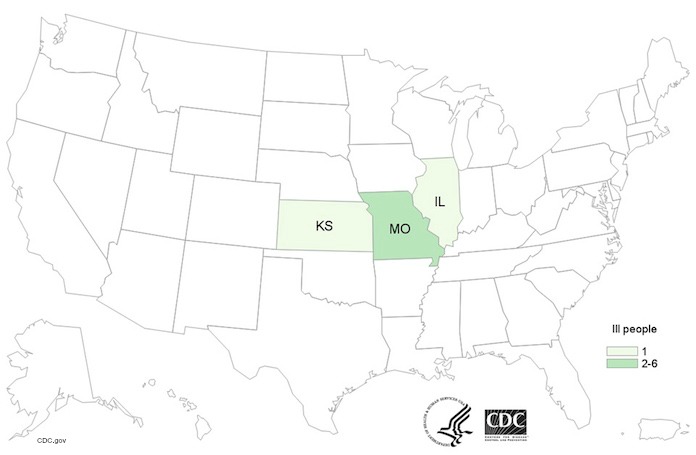A Salmonella Oranienburg outbreak linked to eggs from Good Earth Egg Company of Bonne Terre, Missouri has sickened at least eight people in three states. Two of those sickened have been hospitalized. No deaths have been reported.

Epidemiologic, laboratory, and traceback investigations indicate that shell eggs distributed by that company are the likely source of illnesses in this outbreak. The CDC is working with public health officials in Missouri, the FDA, and several other states to investigate these illnesses.
Data from the PulseNet system is being used to identify people who may be part of this outbreak. PulseNet is the national subtyping network of public health and food regulatory agency labs. Scientists there perform DNA fingerprinting on bacteria isolated from ill persons using pulsed-field gel electrophoresis (PFGE) and whole genome sequencing (WGS).
The case count by state is: Illinois (1), Kansas (1), and Missouri (6). The patient age range is from 1 year to 85, with a median age of 44. Sixty-three percent of ill persons are female. Among seven people who were interviewed, two (29%) have been hospitalized. WGS showed that isolates taken from ill people are closely genetically related to one another. That means that the people in this particular outbreak are more likely to share a common source of infection.
In addition, the strain of Salmonella Oranienburg in this outbreak is also closely genetically related to a Salmonella Oranienburg strain from a 2015 outbreak also linked to the Good Earth Egg Company. In that outbreak, 52 people from six states were sickened. Good Earth Eggs recalled shell eggs back in January of 2016 in response to that outbreak.
In interviews, ill persons answered questions about the foods that they ate before they got sick. All of the six people interviewed said they ate or possibly ate shell eggs the week before they got sick. They ate those eggs in restaurants and at home. Federal, state, and local officials performed a traceback investigation from one restaurant in Missouri where three people said they ate eggs. They found that Good Earth Egg Company supplied eggs to that restaurant.
Then Missouri health officials collected and tested shell eggs from the Missouri restaurant and isolated the outbreak strain of Salmonella Oranienburg. In addition, environmental samples taken at the Good Earth Egg Company processing facility isolated the outbreak strain of Salmonella Oranienburg.
Whole genome sequencing (WGS) showed that the isolates of Salmonella Oranienburg from eggs distributed by the Good Earth Egg Company are closely related to isolates from ill people in this outbreak and from ill people and environmental samples in the 2015 outbreak.
Consumers should not eat and restaurants and retailers should not serve or sell shell eggs distributed by Good Earth Egg Company at this time. These eggs were sold under different brand names. If you don’t know if your eggs came from that company, ask your retailer.
The symptoms of a Salmonella infection include nausea, vomiting, abdominal pain, diarrhea that may be bloody, fever, chills, headache, and muscle aches. These symptoms typically begin six to seventy-two hours after exposure to the bacteria. While most people recover on their own, some become so sick they must be hospitalized.
If you ate shell eggs, especially if you live in the three states affected in this outbreak, and have experienced these symptoms, see your doctor. Salmonella infections are very underreported and there may be more than 200 people sick in this outbreak, using the multiplier of 30.3. Even if you recover completely, long term complications of a Salmonella infection can include reactive arthritis, high blood pressure, and irritable bowel syndrome.




